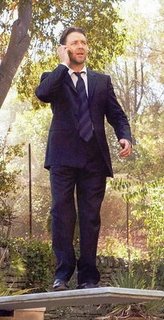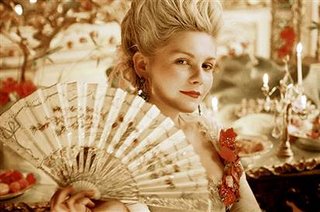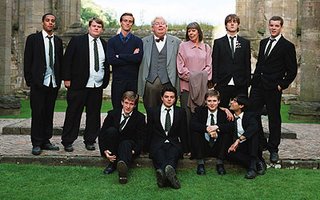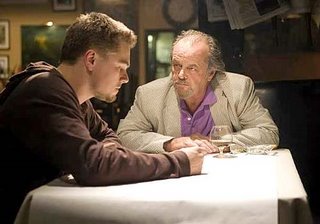 Based on Peter Mayle’s 80s yuppie fantasy A Year in Provence and directed by his old friend and colleague in the advertising business Ridley Scott, A Good Year is a tired, predictable knockabout farce pushed beyond the point of blithe disregard by an atypical performance by the Gladiator star Russell Crowe, unforgettable for all the wrong reasons. His Max Skinner (played as a boy by Freddie Highmore) used to spend idyllic summers at his roguish Uncle Henry’s (Albert Finney) chateau and vineyard in Provence. Now, fully-grown but hardly matured, Max is a bond trader in The City of London, a high-flying millionaire and low-minded boor. When word arrives that Uncle Henry has died, Max takes off to France to settle his affairs, and sell his treasured home to the highest bidder, leaving Henry’s staff, Francis (Didier Bourdon) and wife Ludivine (Isabelle Candelier) out of a job and homeless. A convenient job suspension for insider trading keeps Max in Provence longer than he planned, but just long enough for the rural charm to cast its spell. Intrigue and romance arrives in the form of beautiful American girl Christie (Abbie Cornish), who says Uncle Henry was her father and who might stymie Skinner’s plans for a quick sale.
Based on Peter Mayle’s 80s yuppie fantasy A Year in Provence and directed by his old friend and colleague in the advertising business Ridley Scott, A Good Year is a tired, predictable knockabout farce pushed beyond the point of blithe disregard by an atypical performance by the Gladiator star Russell Crowe, unforgettable for all the wrong reasons. His Max Skinner (played as a boy by Freddie Highmore) used to spend idyllic summers at his roguish Uncle Henry’s (Albert Finney) chateau and vineyard in Provence. Now, fully-grown but hardly matured, Max is a bond trader in The City of London, a high-flying millionaire and low-minded boor. When word arrives that Uncle Henry has died, Max takes off to France to settle his affairs, and sell his treasured home to the highest bidder, leaving Henry’s staff, Francis (Didier Bourdon) and wife Ludivine (Isabelle Candelier) out of a job and homeless. A convenient job suspension for insider trading keeps Max in Provence longer than he planned, but just long enough for the rural charm to cast its spell. Intrigue and romance arrives in the form of beautiful American girl Christie (Abbie Cornish), who says Uncle Henry was her father and who might stymie Skinner’s plans for a quick sale. Eating Crowe
 Based on Peter Mayle’s 80s yuppie fantasy A Year in Provence and directed by his old friend and colleague in the advertising business Ridley Scott, A Good Year is a tired, predictable knockabout farce pushed beyond the point of blithe disregard by an atypical performance by the Gladiator star Russell Crowe, unforgettable for all the wrong reasons. His Max Skinner (played as a boy by Freddie Highmore) used to spend idyllic summers at his roguish Uncle Henry’s (Albert Finney) chateau and vineyard in Provence. Now, fully-grown but hardly matured, Max is a bond trader in The City of London, a high-flying millionaire and low-minded boor. When word arrives that Uncle Henry has died, Max takes off to France to settle his affairs, and sell his treasured home to the highest bidder, leaving Henry’s staff, Francis (Didier Bourdon) and wife Ludivine (Isabelle Candelier) out of a job and homeless. A convenient job suspension for insider trading keeps Max in Provence longer than he planned, but just long enough for the rural charm to cast its spell. Intrigue and romance arrives in the form of beautiful American girl Christie (Abbie Cornish), who says Uncle Henry was her father and who might stymie Skinner’s plans for a quick sale.
Based on Peter Mayle’s 80s yuppie fantasy A Year in Provence and directed by his old friend and colleague in the advertising business Ridley Scott, A Good Year is a tired, predictable knockabout farce pushed beyond the point of blithe disregard by an atypical performance by the Gladiator star Russell Crowe, unforgettable for all the wrong reasons. His Max Skinner (played as a boy by Freddie Highmore) used to spend idyllic summers at his roguish Uncle Henry’s (Albert Finney) chateau and vineyard in Provence. Now, fully-grown but hardly matured, Max is a bond trader in The City of London, a high-flying millionaire and low-minded boor. When word arrives that Uncle Henry has died, Max takes off to France to settle his affairs, and sell his treasured home to the highest bidder, leaving Henry’s staff, Francis (Didier Bourdon) and wife Ludivine (Isabelle Candelier) out of a job and homeless. A convenient job suspension for insider trading keeps Max in Provence longer than he planned, but just long enough for the rural charm to cast its spell. Intrigue and romance arrives in the form of beautiful American girl Christie (Abbie Cornish), who says Uncle Henry was her father and who might stymie Skinner’s plans for a quick sale. Queen For A Day

Opening on a static shot of the young princess supine on a chaise longue, wrapped in lace and surrounded by cakes, Sofia Coppola’s third feature, a kind of dreaming biopic of France’s ill-fated Marie Antoinette confounds expectations, being empty and superficial, but impossible to hate for all that. High-born in Austria, the innocent Marie (gracefully played by a childlike Kirsten Dunst) is married off to the shy Dauphin Louis XVI (Jason Schwartzman) in a match arranged between her domineering mother Maria Teresa (Marianne Faithfull) and the King of France (Rip Torn). Making the journey by coach to Versailles, the young princess is stopped at the border, in the first of Coppola’s more complicated and emotionally resonant scenes, to be divested of everything she owns, including her friends and her beloved puppy. On arriving at Versailles, the teenage princess is astonished at the opulent luxury of the court and troubled by the constant gossip and seemingly endless, incomprehensible protocol.
Without an heir, Marie’s situation is precarious; a fact she is reminded of in her mother’s regular admonishing letters, and the lectures delivered by her ambassador (a wry Steve Coogan). Later, her brother, the Emperor of Austria (Danny Huston in a cameo) arrives to lecture the distracted Louis about his husbandly duties and the two eventually have children. The third act has the increasingly rebellious Marie establish a hideaway in Versailles, a manicured rural idyll where she can raise her daughter and entertain her friends, including a half-imagined affair with a young Swedish soldier (Jamie Dornan). These episodes are languorously told, simple framed moments drawn out into lengthy sections, adding to the ethereal mood but short on drama, dialogue or incident. Critically, Coppola stops her story just at the point where the revolutionary mob (played mostly as noises off) are kicking in the door of the palace; preferring a poetic, symbolic bow on a balcony to showing the Queen’s final bow before Madame Guillotine.
The Past Is A Foreign Country
 The History Boys, the film version of the multi-award-winning play by Alan Bennett reunites the cast and director (Nicholas Hytner) from the theatre production for a snappy trip down memory lane for the 1983 graduating class in a Sheffield secondary school. As the film opens, a small group of nine high-achieving students, having just received their A-level results, are gathered together by their headmaster for an extra term to prepare for the Oxford and Cambridge entrance exams in December.
The History Boys, the film version of the multi-award-winning play by Alan Bennett reunites the cast and director (Nicholas Hytner) from the theatre production for a snappy trip down memory lane for the 1983 graduating class in a Sheffield secondary school. As the film opens, a small group of nine high-achieving students, having just received their A-level results, are gathered together by their headmaster for an extra term to prepare for the Oxford and Cambridge entrance exams in December.Departed to the Judgement
 After mixed success with his two grand epics, The Gangs of New York and The Aviator, Martin Scorsese returns to the mean streets of the American gangster movie for The Departed, a loose remake of the labyrinthine 2002 Hong Kong cop thriller Infernal Affairs and one of the films of the year.
After mixed success with his two grand epics, The Gangs of New York and The Aviator, Martin Scorsese returns to the mean streets of the American gangster movie for The Departed, a loose remake of the labyrinthine 2002 Hong Kong cop thriller Infernal Affairs and one of the films of the year.Both have the backup of their respective administrations; Damon’s police are led by Captain Ellerby (Alec Baldwin) and his undercover experts, Queenan and Dignam (Martin Sheen and a never-better Mark Wahlberg), while Di Caprio has to contend with Costello’s dangerous second-in-command, Mr. French (Ray Winstone) and two henchmen, Fitzy and Delahunt (David O’Hara and Mark Rolston). It’s a brilliant set-up for the tense, twisting, violent drama that follows; rich with the language and psychology of the streets and fused for detonation as each man becomes consumed by his double life, each trying to smoke the outer out and suffering the consequences of living under a death sentence. The two moles lives also intersect at the point of police psychologist Madolyn (Vera Farmiga), who starts a relationship with Colin at the same time as she starts to counsel Billy, who comes to see her as part of his parole.
Departed to the judgment,
A mighty afternoon;
Great clouds like ushers leaning,
Creation looking on.
The flesh surrendered, cancelled
The bodiless begun;
Two worlds, like audiences, disperse
And leave the soul alone.
Emily Dickinson [wiki]






